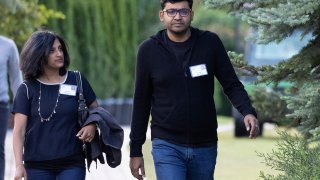
- Most often, companies look to executives in positions like COO or CFO to fill open CEO roles.
- But recent chief executive officer appointments at Weber and XPO Logistics show more companies are seeing value in having a leader with a tech background.
- That provides a new opportunity for chief technology officers and chief information officers to rise to the top.
When it comes to choosing a new CEO, recent history suggests that most companies pick from a small pool.
Over the past 20 years, 85% of newly named S&P 500 company CEOs came from four roles: chief operating officer, divisional CEO, chief financial officer, or a second-layer management position leading a large business unit, according to data from executive search consulting firm Spencer Stuart.
But as the importance of staying ahead of the curve on technology and at the forefront of digital transformation has increased since the start of the pandemic, recent appointments suggest companies are starting to look at technology leaders as potential chief executives.
Get Connecticut local news, weather forecasts and entertainment stories to your inbox. Sign up for NBC Connecticut newsletters.
Those in tech leader positions, usually chief technology officer or chief information officer roles, have been looked at as potential CEOs before, but often when the company is inherently tech-centric. For example, Parag Agrawal was Twitter's CTO before he replaced founder Jack Dorsey in November 2021.
Agrawal, who had been Twitter's CTO since 2017, was described by Dorsey in his resignation letter to staff as "behind every critical decision." As CTO, Agrawal led the company's technical strategy and helped guide the development of its A.I. and machine learning technology, according to his company bio.
While being CEO of Twitter at this particular moment in time is as difficult a task as a CTO to CEO can expect, Ash Athawale, senior managing director of the executive search practice at Robert Half, said that after Agrawal's appointment he had "a lot of CTOs reaching out saying, 'What about me?'"
Money Report
Athawale pointed to two CEOs who both were elevated to that role after largely serving in tech-focused positions: Microsoft CEO Satya Nadella, who previously was executive vice president of the company's cloud and enterprise group that is responsible for building and running its computing platforms, and Intel CEO Pat Gelsinger, who had been CTO of Intel before leaving to become EMC COO and later VMWare CEO.
Arvind Krishna, the CEO of IBM, followed a similar path: he had spent nearly 30 years in various tech leadership positions at the company and most recently oversaw the company's cloud and cognitive software business before being named chief executive in April 2020.
"If it's a tech-centric company and tech is the core business function, it's an easier transition," Athawale said. "But for a manufacturing company, they may look towards someone on the sales side."
But there are an increasing number of companies from other sectors that view technology as the main business driver, providing new opportunities for tech leaders with CEO aspirations.
Weber, the grill manufacturer, appointed Alan Matula, its chief technology officer, as its interim CEO in July after Chris Scherzinger stepped down from the role.
Matula, who was named CTO in March after serving as Weber's CIO since 2015, had previously spent more than 35 years with Shell in various technology-focused roles, including as its CIO from 2006 to 2015.
It's partially a reflection of how a company most known for metal kettle grills is leaning into technology for the next stage of its growth. Weber has leaned into connected grill technologies, recently launching the Weber Connect Grilling Hub which has temperature probes that you push into whatever you're cooking on the grill and connecting to an app on your phone that provides step-by-step directions and notifications for things like when meat needs to be flipped or is done.
Weber has also been active in M&A in the tech space, acquiring smart appliance and technology company June in 2021 after previously leading the start-up's Series C funding round and partnering on products. Weber also acquired iGrill in 2016, a company that made connected thermometers.
"We believe that the connected capabilities offered by our technology-enabled products will enable a closer relationship with our consumers and usher in a new generation of enthusiasts who will join our global community of Weber loyalists," Weber wrote in its S-1 filing leading up to its summer 2021 IPO.
Matula has been credited for leading the company's R&D organization, as well as its Internet of Things and digital initiatives. He said the company will remain focused on "driving product innovation" on the company's third quarter earnings call with analysts on August 15, also noting that he has experience with "global business transformation, cost management and leading the business through unprecedented time of change."
Weber did not respond to a request for comment.
Freight transportation services company XPO Logistics announced earlier this month that Mario Harik would be taking over from Brad Jacobs after the company's spin-off of its high-tech truck brokerage business in its fiscal fourth quarter.
While Harik had been serving as acting president of XPO's less-than-truckload business, or LTL, since last October, he had spent more than 10 years as the company's chief information officer.
On XPO's second quarter earnings call with analysts on August 5, Jacobs said that Harik has been "hands-on with LTL as CIO for seven years because as soon as we acquired the network, we started developing technology for it," adding that Harik had "spearheaded countless innovations that have given us a tremendous commercial advantage."
Athawale said that for tech leaders looking to make the jump to CEO in the future, it's key for them to invest in themselves so that they have the well-rounded skillset to take on those different challenges.
That could include getting an executive MBA or asking to lead a group with a larger organization. Other soft skills, such as public speaking or the ability to effectively present, are also important.
"Sometimes technology folks are viewed as disruptors, but sometimes you don't need disruption," Athawale said. "A company might need strategic, thoughtful leadership; can that technology leader inject their primary functional expertise but also blend that into the business side and all things finance?"






